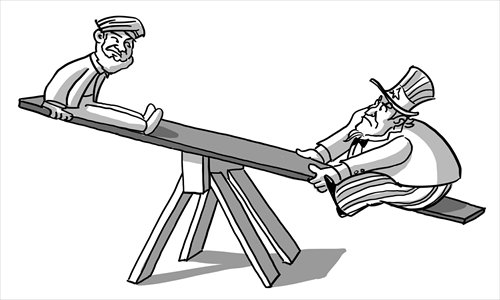US dialogue with Iran would also help curb bloodshed in war-torn Syria

Illustration: Liu Rui/GT
By now, Iran's nuclear program has become integral to its foreign policy, which also includes its strategic interests in neighboring countries like Iraq and Afghanistan, and its alliances with Syria and the Lebanese Hezbollah.
However, it is important to disaggregate these very different cases and to avoid the pitfall of oversimplifying Iran's positions, which are more flexible than they may appear on the surface.
In Syria, there are no "good guys," and the tragic country now resembles the savagery that the world witnessed in 1990s Algeria. The Syrian regime has no policy toward its opposition other than sheer brutality. Sadly, the same is true of the opposition that is supported by Qatari, Emirati, Saudi, Turkish, or US money and logistics.
Syria is a multiconfessional country, and there seems to be good cause for minorities like Kurds, Christians, and Alawites, who have no reason to love the Ba'athist military regime, to support it simply because they fear the bloodbath that would follow should the opposition win.
Iran strongly supports the Syrian regime, but would not be averse to a political solution.
The Iranian regime has proven, repeatedly, that it is hard-headed but pragmatic in its foreign policy.
It is deeply involved and interested in the internal balance of power of the regional countries it considers strategically important. But in all these cases, its approach has been long-term and political, rather than purely ideological.
Iran's primary allies are fellow Shia, who are also the demographic majorities in Lebanon and Iraq. But in every case Iran has cajoled these allies against the temptation of monopolizing power.
Hezbollah is integrated into the Lebanese polity, although in a position of strength; and Iraq has a fragile power-sharing structure. This realism is often overlooked in the demonizing language used by the likes of the Israeli Prime Minister Benjamin Netanyahu.
Without Iran's presence at the negotiation table, the fate of Syria will be grim indeed. With Iran and the US both present, there is hope that a political solution can be imposed against the sectarian savagery we are witnessing today.
Sadly, such a step seems unlikely before a solution is reached on Iran's nuclear enrichment program.
Ironically, the courageous and insightful solution, especially for the US, would be to welcome and collaborate with Iran on finding a political solution to the Syrian tragedy, and use this collaboration as a trust-building stepping stone to convince Iran to modify its nuclear enrichment.
Iran's nuclear program is highly controversial at home, as well as abroad. It has been tremendously expensive and environmentally risky, and it has made the country a target of strategic military threats and debilitating sanctions.
It is important to recall that the current President Hassan Rouhani negotiated a unilateral suspension of nuclear enrichment by Iran more than a decade ago, but this trust-building step was torpedoed by the then US president George W. Bush's infamous "Axis of Evil" stance and the US Congress' allocation of funds for regime change in Iran.
The political fallout in Iran was severe. The military and security establishment and the Supreme Leader Ayatollah Ali Khamenei concluded that the regime was facing an existential threat, both internally from a discontented public that was voting for reformists, and externally from the US.
There was criticism that election results were tampered with in 2005, and in 2009, Mahmoud Ahmadinejad, a belligerent figure close to the security establishment, was appointed as the head of government. Iran also accelerated the nuclear enrichment program to reach a point of mastering technically the potential ability to develop a nuclear deterrent.
However, recent presidential elections in Iran have opened up unprecedented political possibilities. After eight years of belligerence, the Iranian security establishment was facing a crisis of legitimacy, and it showed enough flexibility to choose a political solution by allowing the popular vote to relegitimize and invigorate a highly damaged polity.
These shifts present a unique opportunity for dialogue between the US and Iran. They also present a golden opportunity for forging a political solution to Syria's tragic civil war.
The author is an assistant professor at the International Studies Department at the Chicago-based DePaul University. opinion@globaltimes.com.cn